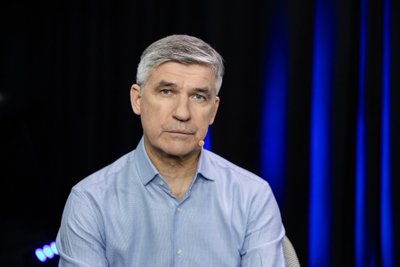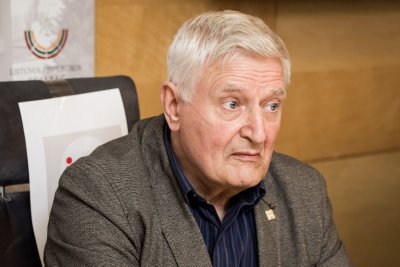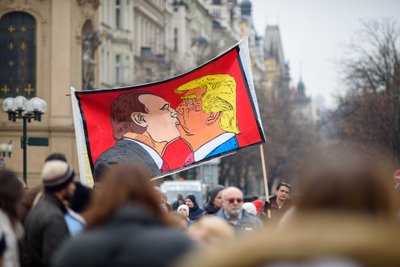Polish Prime Minister Donald Tusk said the country was"closer to military conflict than at any time since World War II." Znių radijas recalls that he was responding to an unprecedented airstrike in which 19 Russian drones violated Polish airspace. Four of them were shot down, while the rest caused a wave of reactions and anxiety across Europe.
Is Putin testing NATO? What is the purpose of this? What military and political consequences could such a major violation of airspace in Poland cause? Is the West ready to respond to this not only with words, but also with actions? This was asked by the interviewees of the News Radio program"Dienos kuusimalus".
Medalinskas: this is just the beginning
Alvydas Medalinskas, a political scientist at Mykolas Romeris University, said he does not think that Putin wants war with NATO, just as NATO does not want war with Russia.
"But it is entirely possible that somewhere in V. Putin's mind there is an idea that if I declare or slam the door on NATO countries and show that they cannot really resist, then in that case I can put forward my package of demands, which he had put forward in December 2021," he said.
According to the political scientist, what happened in Poland could have been predicted, it is a rattling of NATO's doors.
According to him, it was not possible to shoot down all the drones that flew into Poland, as it would have been an extremely expensive operation.
"But the fact is that there are no even the most basic defense systems <...> In this case, V. Putin found NATO countries only partially prepared and at the same time sent a message that, look, anything could happen, and you sit and think about what it could be," he regretted.

A. Medalinskas said he is convinced that this is just the beginning, and if the West does not adopt very strict economic sanctions against Russia, both the US and the EU, then V. Putin will realize that the limits are expanding.
"Then 30, 40, 50 drones could fly in and say 'lost', one leading, while the others just fly with it," he mused.
Stankovic: testing political reaction
Security expert Ignas Stankovičius said on the show that he agreed with the opinion that this is how Putin is testing the West.
"But testing is not the same as testing. There is a test of political reaction, how will they react? And here, I think, it is more important than a test of military readiness. This method has probably been known since the first radars appeared, there have always been provocations and attempts to find out what the coverage is, how they work," he said.
According to I. Stankovičius, this is an attempt to identify"blind zones" - places where flying objects will not be detected.

"But, in my opinion, political testing is more important. I think that the agency [Russian – author], which is present both in Poland and here, informs how the public reacted, how politicians reacted," he said.
The expert noted that in Lithuania, even in such a situation, politicians are still trying to bite each other, which, in his opinion, shows that they do not feel threatened. Meanwhile, in Poland, the situation is different - the political leadership feels threatened.
"Because only in the face of danger do you unite, regardless of political differences. Judging by the statements of politicians, Poland feels this danger more than we do," he added.
Is what happened part of the Russian-Belarusian military exercises"Zapad"? Stankovic said he has no doubts about that.
"If they are trying to simulate an attack or intimidate NATO's eastern flank, the first thing is reconnaissance operations and those drones are a reconnaissance operation," the expert said.
Threats allow you to prepare
Commenting on the Polish decision to close the airspace along the eastern border, Stankovic said that this was necessary to avoid casualties among legally flying aircraft. He said that if anti-aircraft defenses had to be activated, there would be a risk of shooting down the wrong thing.
"If you're shooting, you shouldn't be among the targets," he explained.
In his opinion, one of the Russians' goals is to scare us, but this is counterproductive because the one you scare usually prepares.
"If you're scaring me, I'll probably load my gun," the interviewer said.
Trump supporters urge wait
Laurynas Vaičiūnas, head of the East European College in Wrocław, said on the show that previous messages from the United States were positive for Poland - after President Karolis Nawrocki's visit to Washington, it was confirmed that US troops would not withdraw from Poland.
"In this context of yesterday's events [the News Radio interview took place on Thursday - author], unfortunately, one can notice that there is some disappointment that D. Trump has not yet reacted clearly. His reaction on social media is brief and somewhat enigmatic, it is not very clear what he wanted to say by sending that signal," he said.
This, he noted, was not clear solidarity with Poland.

According to him, Trump's allies living in Poland are urging them to wait, perhaps there will be a more serious response from NATO as a whole.
On Friday, after this Zinių Radio interview, Trump publicly considered whether these violations of Polish airspace were simply a mistake.
According to the Polish military, information about the drones was shared with Poland by Belarus.
"There is no shortage of assessments from the security community that this is an attempt to play games. Belarus has repeatedly sent signals that it would like to open diplomatic channels with Poland," L. Vaičiūnas pointed out.
Kojala: What matters is the practical reaction
When asked why NATO's Article 4 was activated, and not Article 5, Linas Kojala, head of the Center for Geopolitical and Security Studies, said that apparently there was no desire to escalate the situation to a level that would signal a maximum NATO response.
"At the same time, if that response were not one that would create a real deterrent effect and solve the problem not only today, but also in the long term, then the credibility of NATO's Article 5 itself would be shaken," he said.
L. Kojala emphasized in the interview that it is impossible to protect airspace 100 percent, and we do not know what alternatives the Poles had to counter Russian drones.
"Maybe it was also a political signal, because we have fighter jets from NATO countries that shot down Russian drones <...> So if we are talking about the NATO response, let's not forget this aspect, that the alliance as such was activated, that in itself could also be a signal," he urged.
When asked about Trump's reaction, Kojala said that the most important thing is what the practical and concrete response will be.
According to him, there are discussions about new sanctions on Russia and signals that D. Trump is proposing to the EU to impose 100 percent tariffs on India and China - the main buyers of Russian energy raw materials. He said that if the EU agreed, the US would take similar measures.
Listen to the entire Žinių Radio interview with Vaičiūnas, Stankovičius, Kojala and Medalinskas here:

